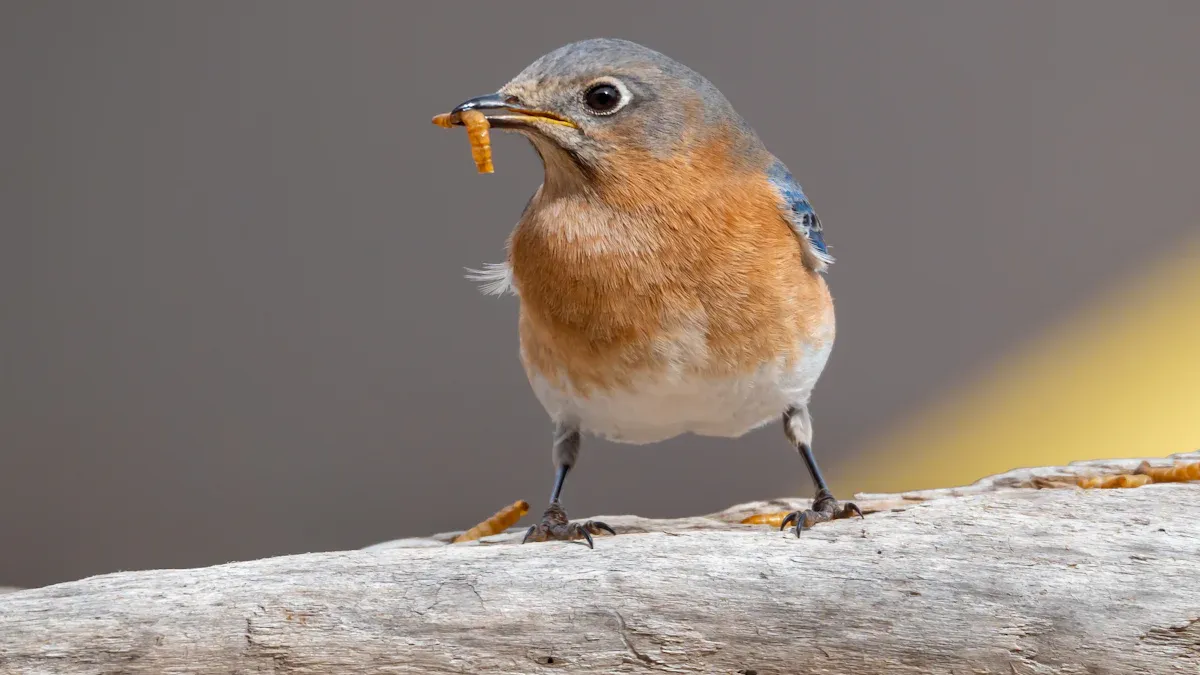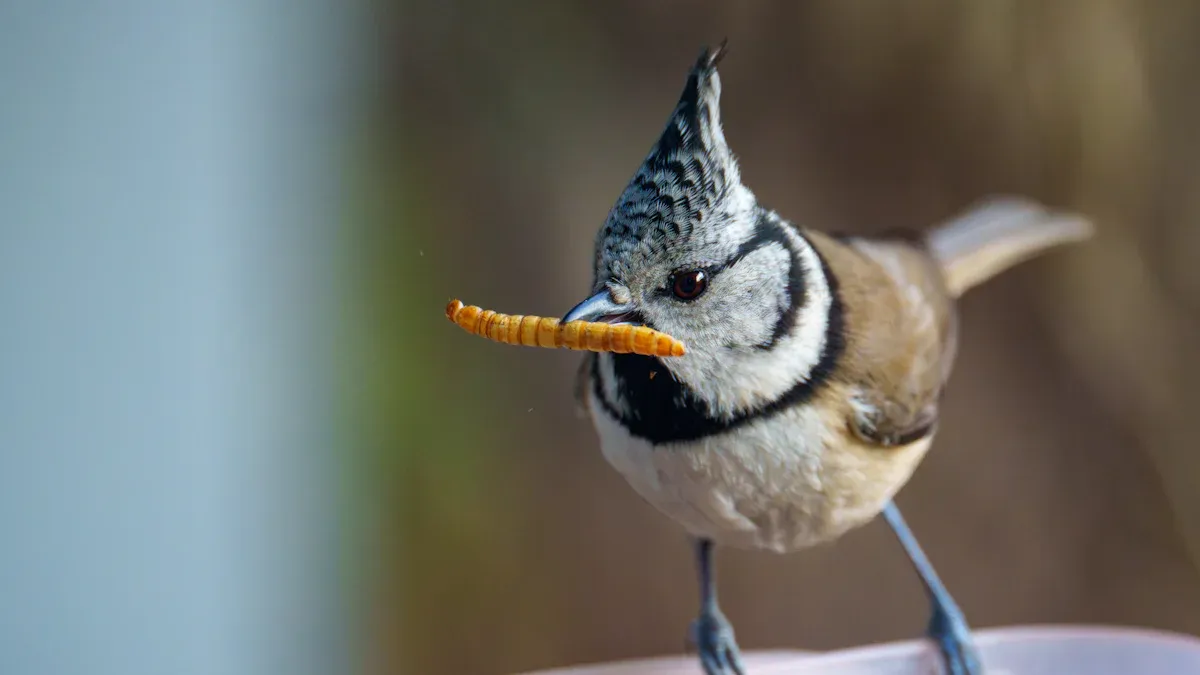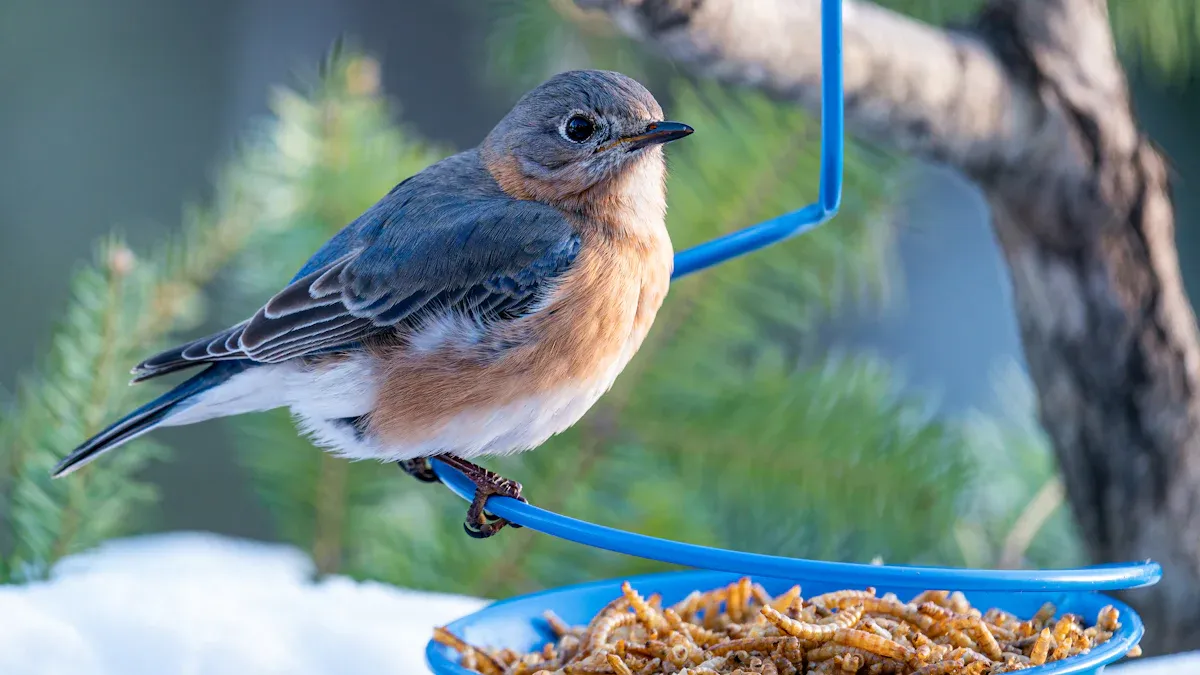
Bird seed with mealworms offers a powerhouse of nutrition for backyard birds. Dried mealworms contain 53% protein and 28% fat, making them an energy-packed treat. Birds thrive on this nutritious boost, which supports their health and vitality. By mixing mealworms into regular seed mixes, backyard birdwatchers can create a thriving and lively habitat.
Key Takeaways
- Bird seed with mealworms gives birds protein and healthy fats. This helps them stay energetic, grow well, and keep feathers strong.
- Adding mealworms brings many bird types to your yard. It makes your backyard more diverse and full of life.
- Store and feed bird seed the right way to keep it fresh. This helps birds stay healthy and your yard safe for them.
The Nutritional Benefits of Bird Seed with Mealworms

Protein for Energy and Growth
Protein plays a vital role in a bird’s diet. It helps birds grow strong and stay active. Mealworms, a key ingredient in bird seed with mealworms, are packed with protein. This nutrient supports muscle development and provides the energy birds need to fly, forage, and thrive. Birds, especially during nesting and molting seasons, rely on protein to build and repair their feathers. Adding mealworms to your backyard feeding routine ensures they get this essential nutrient.
Essential Fats for Warmth and Feather Health
Fats are another crucial component of bird seed with mealworms. They help birds stay warm during cold weather and maintain healthy feathers. Mealworms are rich in omega-6 polyunsaturated fatty acids (PUFAs), which enhance endurance and improve overall performance in birds. Studies have shown that omega-6 PUFAs contribute to better aerobic metabolism and endurance capacity. Here’s a closer look at the research:
| Study | Findings |
|---|---|
| Price, 2010; Pierce and McWilliams, 2014 | Essential omega-6 PUFA may enhance endurance capacity and aerobic metabolism in birds. |
| Ayre and Hulbert, 1996; Ayre and Hulbert, 1997 | High levels of omega-6 PUFA in muscle membranes linked to improved endurance in mammals. |
| Arnold et al., 2015 | Positive correlation between omega-6 fatty acid content in skeletal muscle and maximum running speed in mammals. |
| Pierce and McWilliams, 2005; Pierce et al., 2005 | Passerines with higher omega-6 PUFA fat stores showed improved performance in short-term exercise. |
| Carter et al., 2020 | Migratory birds with omega-6 PUFA fat stores had better endurance flight performance. |
By including mealworms in their diet, birds can build fat reserves that keep them warm and ready for long flights.
Fiber for Digestive Support and Overall Health
Fiber is often overlooked, but it’s essential for a bird’s digestive health. Bird seed with mealworms provides a balanced mix of fiber that supports smooth digestion. A healthy digestive system allows birds to absorb nutrients efficiently, keeping them strong and active. Fiber also helps prevent digestive issues, ensuring birds can enjoy their meals without discomfort. Offering mealworms as part of a bird’s diet promotes overall well-being and vitality.
Behavioral Advantages of Bird Seed with Mealworms
Attracting Insect-Eating Birds and Other Species
Bird seed with mealworms is like a magnet for insect-eating birds. These birds, such as robins, bluebirds, and wrens, are naturally drawn to the protein-rich mealworms. But it doesn’t stop there. Many other species, including sparrows and finches, also enjoy this nutritious treat. An 18-month study conducted at 23 residential properties revealed something fascinating. Properties that offered supplementary feeding, including mealworms, attracted a higher diversity of bird species. Monthly bird surveys showed that these feeding spots had richer and more varied bird communities compared to those without feeders. By adding mealworms to your backyard, you can create a vibrant space teeming with life.
Supporting Natural Foraging Instincts
Birds are natural foragers. They don’t rely solely on feeders for their meals. Instead, they explore their surroundings, searching for insects, seeds, and other food sources. Offering bird seed with mealworms supports this instinct. It encourages birds to visit your backyard while still allowing them to forage naturally. You might even notice how birds communicate with each other about food sources. Their chirps and calls often signal others to join the feast. This behavior not only keeps birds active but also strengthens their social bonds.
- Birds enhance their diet by foraging in natural settings.
- They maintain their instinctual behaviors while enjoying the mealworms you provide.
- Watching their interactions can give you a glimpse into their fascinating world.
Enhancing Backyard Birdwatching Experiences
Adding bird seed with mealworms to your feeder transforms your backyard into a birdwatcher’s paradise. The variety of species it attracts makes every day a new adventure. You might spot a bright bluebird one morning and a curious wren the next. The lively activity around your feeder creates a dynamic and engaging environment. It’s not just about watching birds eat; it’s about observing their unique behaviors, from playful hops to graceful flights. Providing mealworms also ensures that birds stay healthy and energetic, making their visits even more delightful to watch.
Tip: Simply mix mealworms into your regular bird seed or offer them alone in a dish or hopper feeder. You’ll be amazed at how quickly the birds flock to your yard!
Practical Tips for Using Bird Seed with Mealworms

How to Choose High-Quality Bird Seed with Mealworms
Selecting the right bird seed with mealworms ensures your backyard visitors get the best nutrition. Look for mixes that include high-quality seeds like sunflower seeds and millet. These ingredients provide essential nutrients and are favorites among many bird species. Some brands even offer specialized mixes tailored to attract specific birds, which can help reduce waste and bring more variety to your yard.
Reputation matters too. Established brands with positive reviews often deliver reliable quality and appeal to birds. Always check the ingredient list to ensure mealworms are included in generous amounts. A well-balanced mix will keep your feathered friends coming back for more.
Feeding Tips for a Healthy and Happy Backyard
Creating a welcoming environment for birds involves more than just filling a feeder. Here are some tips to keep your backyard birds healthy and happy:
- Set up multiple feeding stations in different areas to reduce crowding.
- Use feeders instead of scattering seed on the ground to minimize waste and pests.
- Keep feeders clean by washing them regularly with a solution of one part bleach to nine parts water.
- Provide fresh seed and avoid letting it get moldy.
- Rake up seed debris and droppings under feeders to maintain a clean space.
By following these tips, you’ll create a safe and inviting space for birds to enjoy their mealworms and seeds.
Proper Storage to Maintain Freshness and Quality
Proper storage keeps your bird seed with mealworms fresh and nutritious. Follow these best practices:
- Store seed in airtight containers to prevent moisture and pests.
- Use silica gel packets to absorb excess moisture.
- Keep seed in a cool, climate-controlled room whenever possible.
- Limit your supply to two or three weeks during summer to ensure freshness.
- Inspect seed bags for dust or mold before use.
These steps will help maintain the quality of your bird seed, ensuring your backyard birds get the best possible nutrition.
Bird seed with mealworms is a game-changer for backyard bird feeding. It provides essential nutrients while encouraging natural behaviors. This mix attracts a variety of species, creating a lively and colorful environment. Adding it to your feeding routine ensures a healthier, happier bird population in your yard.
Pro Tip: Start today and watch your backyard transform into a birdwatcher’s dream!
Article by Felix.
FAQ
What types of birds eat mealworms?
Mealworms attract insect-eating birds like robins, bluebirds, and wrens. Seed-eating birds, such as sparrows and finches, also enjoy them.
Can mealworms be fed year-round?
Yes! Mealworms provide essential nutrients in all seasons. Birds benefit from their protein and fat during nesting, molting, and colder months.
How should mealworms be offered to birds?
Place mealworms in a dish or hopper feeder. Mixing them with regular bird seed works too. Birds will flock to your yard in no time!


